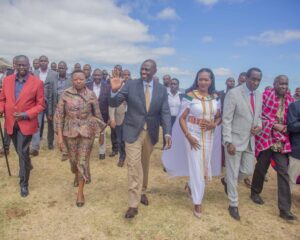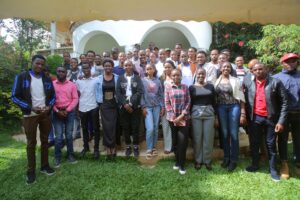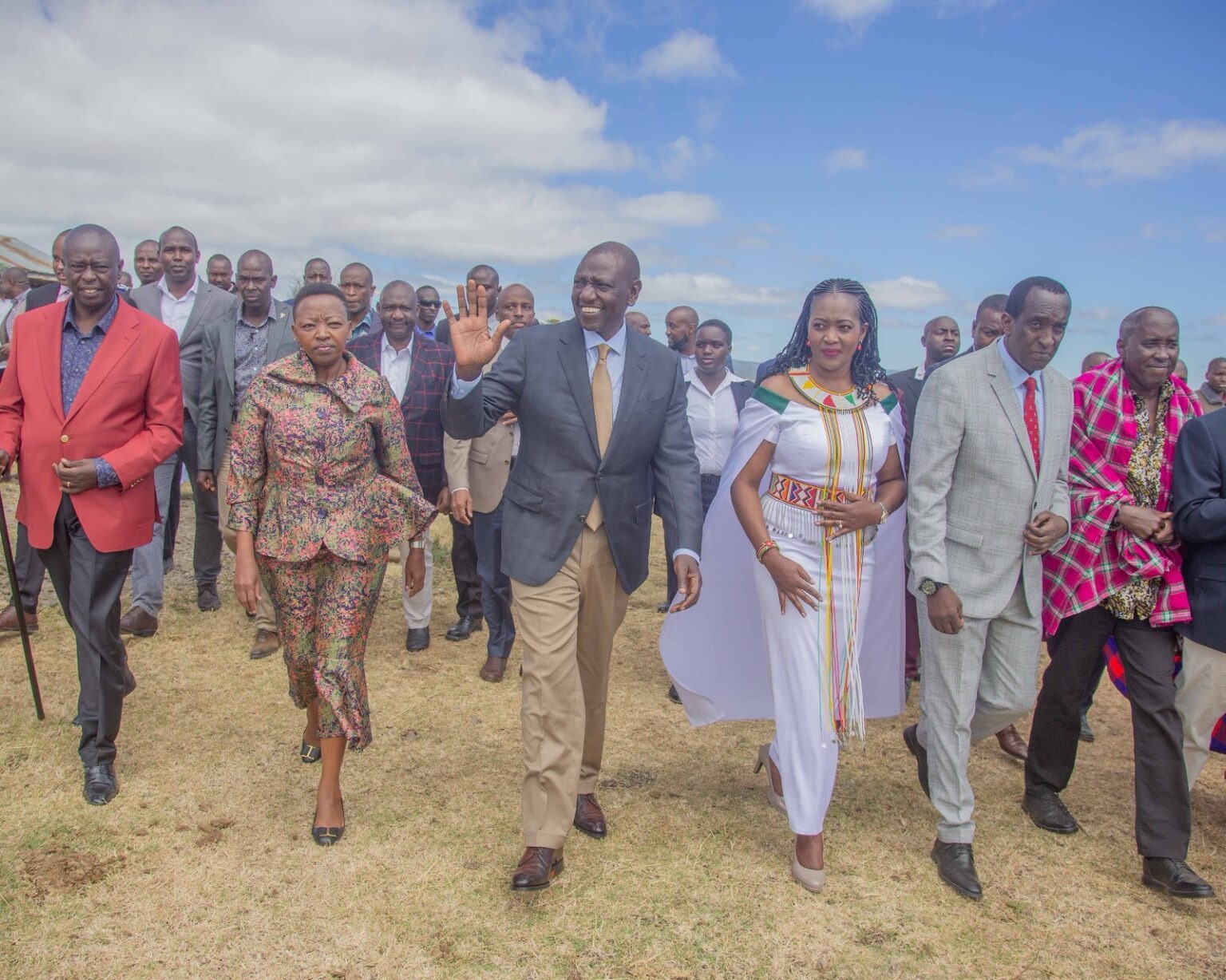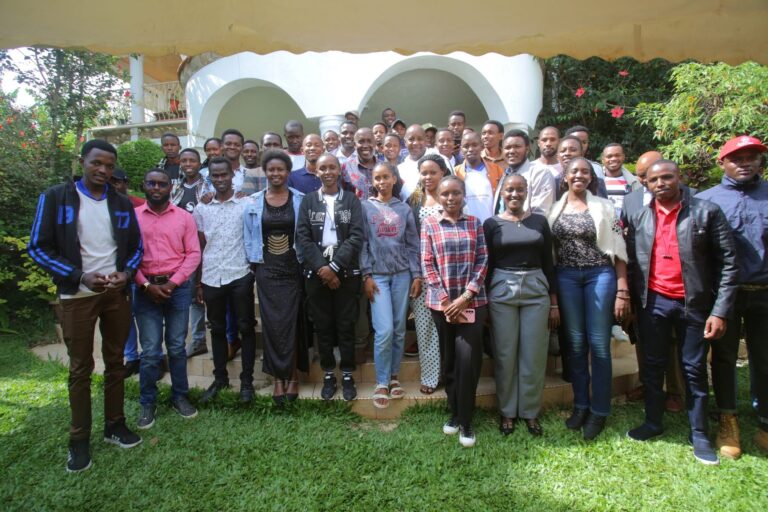It’s Easter Sunday. Jesus is risen. Chickens are dying. And I like Lazarus have also risen. Not from the dead per se, but from that black hole we tend to fall into between January and April, where dreams nap and airtime is a luxury.
It’s Holy Week or Betrayal Week depending on your Judas personality type. But here I am, washed in ugali and cheap grace, waiting for someone to roll away this tombstone of reminiscence.
Lunch with Power and Polyester
Juzi, I was having lunch with a big boy from government, the kind young Facebook bloggers photograph with captions like “Meerayu Ele!” or “Huyu ndiyo mrima yetu!” You know the type: they’re paid 500 bob to hype the man, armed with a pseudo account. When the 500 runs out, they use the same account to roast him. Then another 500 arrives to defend him.
What shall we call that? Politics? No. That’s polyester loyalty with a reversible lining.
As we sat eating nyama (the official dish of Kenyan governance), my eyes kept drifting to his tie. It looked like it was plotting his assassination. Tighter with every bite. His Adam’s apple moved in and out with each chuckle, like a pirated cartoon. When he laughed, it sounded like a cat scratching iron sheets. The shoulders that carried “State Duties” moved up and down like a malfunctioning seesaw.
He works in the delivery unit. Don’t ask what that means. He couldn’t define it either. But the perks are real. He doesn’t touch his salary. He lives on what he calls “kuja tu, hatuwezi kosana.” That, my friends, is the Nairobi we’ve built: everyone a dealmaker, Kenya the deal.
We were in school together. If we’re judging by zeros, he had more in high school, and he’s maintained that trend, in his bank account. That’s not self-deprecation. It’s self-awareness. Socrates said “know thyself,” or maybe I heard it from a masculinity podcast. We weren’t best buddies, but we respected each other like a cigarette smoker nodding at a weed smoker. After school, we parted ways. Now I’m here, hoping his tie doesn’t succeed in its suicide mission.
Of Bibles, Budgets, and Betrayals
On most Sundays, our pulpits are full. Politicians are lined up. Cameras are rolling. The President visits with a Bible in hand, never a budget. We’ve clapped, sung, prayed, and posed. Then he leaves.
Even today, he was in Ntulele. Last Sunday, his deputy, Kindiki, was in Kilgoris. And on those very stages, our leaders trade real demands for recycled thank-yous. “Thank you for CS Soipan Tuya!” “Asante for PS Ololtua!” Meanwhile, our roads are a suggestion, our hospitals are on life support, and our youth have memorized the taste of disappointment.
But on May 6, 2025, something will be different.
For the first time since taking office, President William Ruto is coming for an official development tour. Not another prayer rally. Not another gospel festival disguised as governance. This time, the agenda includes hospitals, roads, water, schools, things that actually matter.
So dear Narok leaders, this is not the day for hallelujahs. This is the day for hard questions.
The Cult of the Photograph
In every presidential visit, there are two kinds of posters:
One printed days before, screaming “Karibu Narok, Rais!” with smiling faces of MPs who haven’t passed a single bill since 2022.
And the other? Taken on the day. Everyone wants to be in a photo with the President. Some walk uninvited beside him, stretching their strides to match his, just to be in frame. Not because the public needs that image but because they want to be seen as known by power.
It’s the Kenyan tragedy that Frantz Fanon wrote of in “The Wretched of the Earth” postcolonial elites obsessed not with changing the state, but replacing the colonial master’s seat with their own silhouette. The old master is gone. But the photo-op throne remains.
Reminds one of Boss from the Kenyan setbook “Betrayal in the City”, who built a regime so obsessed with optics and praise that dissent was labeled betrayal and poverty was denied on national radio. The photograph is today’s version of “saying the country is fine.” And if you’re not in the photo? You’re not relevant.
You see it in every county. They don’t lobby for funding. They lobby for angles. For position. For visibility.
But history has no use for portraits. It demands progress.
The Gospel According to Development
Yes, we are a prayerful people. But James 2:17 reminds us: “Faith by itself, if it does not have works, is dead.”
So, when the microphone is passed, when the cameras roll, when the President sits beneath the white tent… what will you say?
Here’s what the people need you to ask:
- Water: “Mr. President, can we count on a proper county-wide water infrastructure plan? Our people still walk miles for muddy water.”
- Health: “When will we see funding for modernizing our health centers? Our mothers still give birth in facilities with no power.”
- Education: “Can we expect investment in our schools; from classes, desks, labs, teachers, dormitories?”
- Agriculture & Pastoralism: “What is the government’s plan for livestock markets, milk cooling plants, and drought mitigation?”
- Roads: “When will key roads — like Ewasonyiro–Loita, Ngosuani–Morijo, and Naikarra–Olpusimoru finally be tarmacked?”
- Youth & Jobs: “Can we expect real job creation initiatives tailored to our unique economic setup or will the youth keep waiting for tenders that never come?”
- Land & Compensation: “What is the government’s commitment to resolving land injustices especially in the Mau, Kedong, and Olchorro areas?”
- Tourism Investment: “We host the Mara. Where is the Mara money in our local economy?”
This isn’t a script for “Kigogo” or “A Doll’s House” it’s real life. In Kigogo, people died singing songs of freedom they never tasted. In A Doll’s House, Nora walks out the door seeking a new voice because praise alone doesn’t change her life. Neither will ours.
This is not the time for sycophantic thank-yous. This is the time for strategic insistence.
We can thank the President at the ribbon-cutting after he brings something tangible. Not before.
Our Leaders, This is Your Moment
Governor Patrick Ole Ntutu. Senator Ledama Ole Kina. MP Gabriel Ole Tongoyo.
You are not competing for the loudest “Amen.”
You are not being scored on who calls the President “our father” the most times.
Narok is not a praise-and-worship constituency.
We are a county with real problems, real potential, and finally a real opportunity.
Don’t waste it.
Don’t trend for nothing. Don’t trade demands for dancing. Don’t convert this visit into a TikTok moment.
This is not ceremony. It’s a constitutional moment. A referendum on our seriousness.
Let’s not sit under tents clapping for headlines. Let’s look the President in the eye and say:
“We are grateful. But we are not satisfied. Not yet.”
Because development doesn’t come by invitation.
It comes by insistence.
When other counties host presidential visits, they bring blueprints. Budgets. Demands.
We bring choirs.
As Ngũgĩ wa Thiong’o once wrote in “Petals of Blood”: “Weep not, my country. One day you will be free.”
But freedom is not handed out in Sunday offerings. It is wrestled from power with truth, unity, and relentless clarity.
Not this time.
Let us come with a new posture. Not of rebellion, but of resolve. Not of desperation, but of direction.
Isaiah 1:26 says: “I will restore your leaders as in days of old… then you will be called the City of Righteousness.”
But restoration only comes through responsibility.
Let us not become like Balaam, prophets for hire, speaking only what pleases kings.
Let us become like Isaiah, who, though trembling, told the truth.
May 6 is not just another calendar event.
It is a boardroom. A town hall. A development pitch.
The President is coming. This time, don’t just sing.
Stand. Speak. Strategize.




